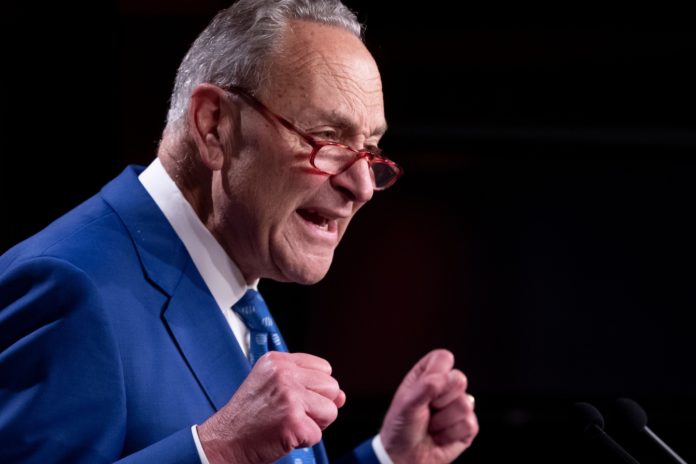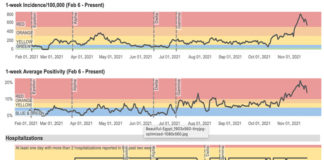
The health care winners and losers in Democrats’ economic package
After more than a year of infighting, Senate Democrats finally secured their health-care win.
The economic package is a far cry from everything many in the party wanted — and from the 2020 campaign rhetoric from some top presidential contenders to upend American health coverage in favor of Medicare-for-all. Yet, the legislation still amounts to the biggest changes to the health system in about a decade.
It took months of turbulent negotiations, but every Senate Democrat voted for the legislation yesterday, a feat of political wrangling to secure the support of both the party’s centrist and more liberal members. The package now moves to the House, where Democrats aim to approve it on Friday, delivering a victory to President Biden and giving Democrats an achievement to campaign on three months before the midterm elections.
Here’s who won, and who lost, in the final iteration of Democrats’ bill that aims to lower health-care costs, combat climate change and reduce the federal deficit through new tax increases.
Heather Caygle, Punchbowl News:
And here’s Schumer:
“We did it. I’m so proud of my caucus to do something so big and so grand and so difficult.And we did it.” pic.twitter.com/hwfezfikXu
— Heather Caygle (@heatherscope) August 7, 2022
Senate Majority Leader Chuck Schumer (D-N.Y.)
Senate Democrats used a fast-track budget maneuver to pass their bill without any GOP votes. But they couldn’t afford to lose the support of any members of their own party.
For months, Schumer negotiated privately with Sen. Joe Manchin III (D-W.Va.) to secure a deal the centrist holdout could support. The pair forged a compromise on broader legislation, even as some in the party thought the package would turn into a health-care-only bill. And on the floor, senators stuck together, largely shooting down amendment after amendment to keep the underlying bill intact.
Drug pricing advocates
Drug pricing advocates blanketed the airwaves in support of Democrats’ drug pricing ambitions. Their goal: Deliver the biggest defeat Big Pharma has suffered.
It was a major counteroffensive to the pharmaceutical industry’s multimillion-dollar lobbying campaign designed to keep Democrats from passing legislation to allow Medicare to negotiate drug prices. Groups mobilized their efforts for months, including patient groups, major labor unions and other liberal-leaning organizations. Polling, such as from the Kaiser Family Foundation, has suggested that about half of Americans think the policy should be a top health-related priority for Congress.
The package includes an array of policies aimed at lowering the sometimes-sky-high cost of medicines for seniors on Medicare and would prevent future administrations from refusing to do so, to the ire of the pharmaceutical industry. The drug negotiation components are smaller than Democrats had originally sought, but some lawmakers believe the provisions crack open the door to attempting to pursue broader legislation in the future.
The bill also caps seniors’ out-of-pockets costs for drugs at $2,000 annually and imposes a $35 limit on how much they’d pay per month for insulin.
Meanwhile, provisions extending to the private market met a different fate. Democrats attempted to require drugmakers to pay rebates when they hike prices faster than inflation in the private insurance market. But the arbiter of the Senate’s rules said such a move wouldn’t fly under the fast-track budget maneuver Democrats used to pass the legislation without any Republican votes.
Meanwhile, Republicans successfully stripped a $35 monthly cap on the cost of insulin — which is used by diabetics to manage their blood sugar levels — from the legislation for patients with private insurance.
Juliette Cubanski, deputy director at the Kaiser Family Foundation:
It will be a 🚨big deal🚨 for Medicare beneficiaries if their out-of-pocket drug costs are capped at $2,000 per year, as proposed in the IRA. As it stands now, annual out-of-pocket costs can exceed $10,000 for the most costly drugs since Part D has no out-of-pocket spending cap.
— Juliette Cubanski (@jcubanski) August 5, 2022
Big Pharma
For about two decades, the pharmaceutical industry has fiercely fought proposals to allow Medicare to negotiate the price of prescription drugs. It is poised to lose the battle.
It’s a massive defeat for an industry not used to losing. Amid Democrats’ struggles to craft a deal, the industry threw its lobbying might behind efforts to oppose the party’s signature drug pricing plan, and waged a last-ditch fight to attempt to strike the provisions from the bill.
Sen. Bernie Sanders (I-Vt.)
The chair of the Budget Committee had originally sought a massive $6 trillion package. Then last summer, Sanders helped finalize a $3.5 trillion blueprint to pave the way for a sprawling social spending bill.
But the legislation passed over the weekend is much smaller and doesn’t come close to the package that Sanders thinks Democrats — with their rare control of the House, Senate and White House — should have adopted, our colleague Tony Romm reports.
Sanders championed policies that have long been out of the package, such as lowering the Medicare age and expanding the federal health insurance program for seniors and those with disabilities to cover hearing, dental and vision. Over the weekend, he offered several amendments to the legislation, including health-related provisions, but they were struck down.
Caveat: While Sanders made clear he wasn’t happy with the final bill, his rise in the party — starting with the 2016 presidential election — has led to a further embrace of liberal policies. The bill reflects that.
More from Sanders:
Today the Inflation Reduction Act passed the Senate 51-50. In my view, this legislation goes nowhere near far enough for working families, but it does begin to address the existential crisis of climate change. It’s an important step forward and I was happy to support it. pic.twitter.com/x27lx2FFiJ
— Bernie Sanders (@SenSanders) August 7, 2022
Champions of closing the Medicaid coverage gap
Democrats failed to plug one of the Affordable Care Act’s biggest holes over the objections of advocates who had strongly fought for the inclusion of such a measure. Previous versions of the bill extended Medicaid coverage to about 2.2 million people living in the dozen states where GOP officials have refused Obamacare’s Medicaid expansion, but the Senate’s bill didn’t include the provision.
On the Senate floor, Sen. Raphael G. Warnock (D-Ga.) — who hails from a non-expansion state — attempted to add the policy into the package. But the maneuver was shot down, as Democrats largely stuck together in opposing major changes to the bill.
The Post’s Tony Romm:
Warnock offers amendment to extend ACA subsidies, close Medicaid coverage gap. Wyden gets up and says he “reluctantly” opposes on behalf of Dems to preserve the deal.
It’s sorta like participating in a wake for the vision of Build Back Better.
— Tony Romm (@TonyRomm) August 7, 2022
On the Hill
For Democrats, getting to this moment has been fraught with uncertainty — a lengthy and tense path toward passing a scaled-back version of an economic package.
Here’s a look at the key moments.
April 28, 2021: “Let’s give Medicare the power to save hundreds of billions of dollars by negotiating lower drug prescription prices. … And the money we save, which is billions of dollars, can go to strengthen the Affordable Care Act and expand Medicare coverage benefits without costing taxpayers an additional penny.” — Biden
Oct. 21, 2021: “Joe [Manchin]’s not a bad guy; he’s a friend.” — Biden
Nov. 19, 2021: “While this version of the bill isn’t everything we want or that our communities deserve, we recognize that this transformative piece of legislation was developed with the slimmest of margins in the House and Senate, and under the strict rules of budget reconciliation.” — Rep. Pramila Jayapal (D-Wash.), chair of the Congressional Progressive Caucus
Dec. 19, 2021: “Despite my best efforts, I cannot explain the sweeping Build Back Better Act in West Virginia and I cannot vote to move forward on this mammoth piece of legislation.” — Manchin
July 27: “After many months of negotiations, we have finalized legislative text … We urge every member of the U.S. Senate to support this important legislation.” — joint statement from Schumer and Manchin
Aug. 7: “It has been a long, tough and winding road, but at last we have arrived. … we have gotten it done.” — Schumer
From our reporters’ notebook
The Post’s Dan Diamond writes to us:
There are now more than 7,500 confirmed infections of monkeypox in the United States — well up from the 700 reported on July 7. And while those cases remain overwhelmingly concentrated among gay and bisexual men, health officials Friday scrambled to respond after a day care worker was confirmed positive in Illinois and potentially exposed dozens of children, our colleagues Dan Diamond, Fenit Nirrapil and Lena Sun report.
As of Friday night, no one else had tested positive, and officials had rushed vaccines to the kids, who normally are not authorized to receive the shots.
“Obviously, a clock is ticking … The faster you give someone a vaccine [after exposure], the more likely it’s going to prevent infection,” one administration official told Dan, crediting the newly launched White House team of monkeypox coordinators for helping speed up the federal response.
Federal officials also have been moving forward with a plan floated last week by Food and Drug Administration Commissioner Robert Califf to split vaccine doses into fifths and administer them intradermally, rather than subcutaneously, Dan reports. Califf and other officials have argued the change would provide sufficient protection and maximize existing supply of Jynneos vaccines, which have been under heavy demand from states.
State scan
Abortion law in Indiana leads to fallout for state, politics
Indiana’s new near-total abortion ban produced immediate political and economic fallout over the weekend, as some of the state’s industry leaders objected to the restrictions, Democratic lawmakers strategized ways to amend or repeal the law, and abortion rights activists made plans to help people access the procedure elsewhere, our colleagues Amber Phillips and Tom Hamburger report.
The Indiana law, which the Republican-controlled legislature approved late Friday and Gov. Eric Holcomb (R) signed moments later, was the first state ban passed since the fall of Roe v. Wade. The law, which will take effect Sept. 15, allows abortions only in cases of rape, incest, lethal fetal abnormality or for the health or life of the mother.
Some Indiana businesses have warned that the law could impede their ability to recruit and retain employees, negatively affect tourism and deter outside investors from coming into the state. Already, the pharmaceutical giant Eli Lilly, one of the state’s largest employers, said it would look elsewhere for its expansion plans.
Yet, the law represents a victory for many abortion foes, who have hailed the measure’s passage as a road map for conservatives in other states pushing similar bans.
The ACLU of Indiana:
In other health news
- Biden tested negative for the coronavirus twice over the weekend, following a mild but protracted “rebound” case that extended his isolation period.
- In Florida: The Tampa Bay area’s top elected Democratic prosecutor vowed to fight his suspension from office by Gov. Ron DeSantis (R) over his pledge not to prosecute potential crimes related to the state’s restrictions on abortions or gender-affirming care for minors.
- The Senate aims to vote to protect marriage equality when it returns to Capitol Hill in September, Schumer told reporters yesterday, according to multiple media outlets. Democrats in the interim are working to secure the necessary 10 Republican votes, which might be possible, after 47 GOP lawmakers broke ranks to pass similar legislation in the House last month, our colleagues Marianna Sotomayor and Hannah Dormido report.
Health reads
Sugar rush
Thanks for reading! See y’all tomorrow.








